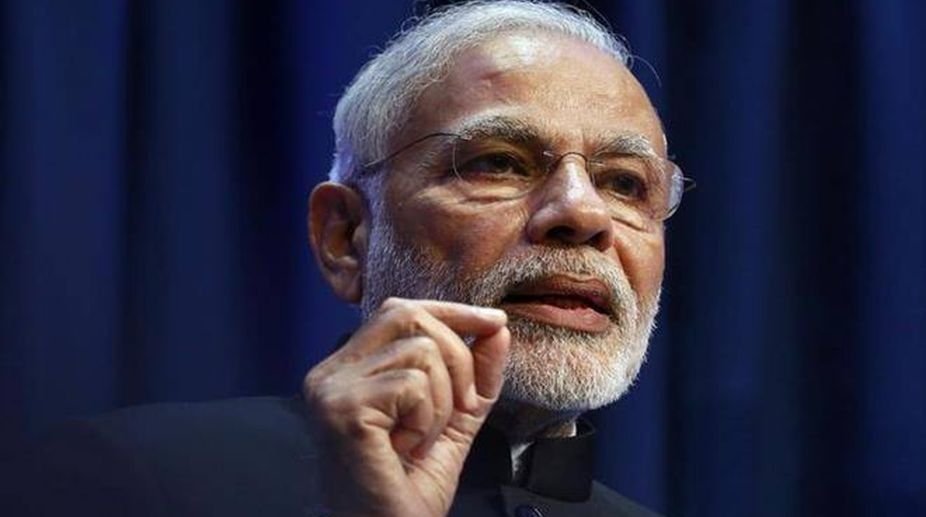Assam’s grand Jhumoir show: 8,000 performers, PM Modi to attend
Assam’s Jhumoir Binandini event on February 24 will feature over 8,000 performers showcasing the traditional Jhumoir dance at Sarusajai Stadium, Guwahati.

PM Narendra Modi (PHOTO: Facebook)
Describing India as a bright spot in the global economy, Prime Minister Narendra Modi on Friday urged global investors to invest in its textile industry and said the domestic market for apparel and lifestyle products will reach $160 billion by 2025.
"India has emerged as one of the most attractive global investment destinations. This has been made possible by a series of sustained policy initiatives," Modi said in an address after inaugurating the first-of-its-kind three-day "Textiles India 2017" fest here.
Advertisement
"We have one of the most liberal investment policies for foreign investment in the textile and apparel sector. We allow 100 percent FDI through automatic route in these sectors."
Advertisement
Emphasizing that the textiles industry had a pivotal position in the Indian economy, Modi said the country had an abundant supply of raw material like cotton, wool, silk, jute and man-made fibre.
"In fact, it is the world's largest producer of cotton and jute, and second largest producer of silk and man-made fibre. This provides us the distinct advantage of backward integration, which many other countries may not have.
"In addition, India has strong spinning, weaving, knitting and apparel manufacturing capacities. Young, skilled labour is available at a reasonable cost," said the Prime Minister, who arrived in Gujarat on Thursday on a two-day visit.
Modi said India's high economic growth had resulted in higher disposable income, resulting in higher demand for products.
"Ours is a nation of aspirational youth who wish to spend on textiles, apparel and handcrafted lifestyle products. The domestic market for apparel and lifestyle products, currently estimated at $85 billion, is expected to reach $160 billion by 2025. This growth will be driven by the rising middle class."
He said that based on the "Make-in-India" initiative, the organised textile industry was being infused with the mantras of 'skill, scale, speed' and 'zero-defect, zero-effect' for scaling up employment, production and exports.
"There is also a high global demand for textiles and apparel manufactured in our country. India is the world's second largest exporter of textiles, commanding a global share of around 5 percent. Indian textiles, including traditional handloom and handicraft products, are exported to more than a hundred countries."
The Prime Minister said the textile sector was the second largest employer after agriculture.
"Over 45 million people are employed directly in the sector and over 60 million are employed in allied activities. The textile is an area which works as bridge between agriculture and the industry. Be it farming of cotton or production of silk, their end product depends on textile sector. This sector provided material for the products of farmers," he said.
Modi said an integrated skill development scheme was also being implemented to address the critical gap of skilled manpower, through industry-oriented training programmes.
"Each state should appoint nodal officers dedicated to a few well-known products who would facilitate producers and traders across the value chain. The intervention should start from production to export of garments. It should meet the specific requirement of domestic as well as export markets."
He called for an action plan to study and map the requirements of people in large global markets and monitor new trends in fashion and textiles in these areas on a real time basis.
"Government councils and industry bodies should rise to the occasion, in a spirit of cooperation. This would enable us to channelize our energies in meeting those requirements and give a boost to our exports."
Dubbing innovation and research as new mantras for growth and wealth generation, Modi said: "The textile industry will have to constantly innovate and research for growth and to tap new markets. There is a demand for products with zero carbon footprint. Holistic lifestyle has become a buzzword. The market for Organic Dyes, clothes and fabrics made of organic products is growing. Our effort should be to innovate in organic products."
Union Textiles Minister Smriti Irani, Andhra Pradesh Chief Minister N. Chandrababu Naidu and Gujarat Chief Minister Vijay Rupani were present at the event.
Advertisement